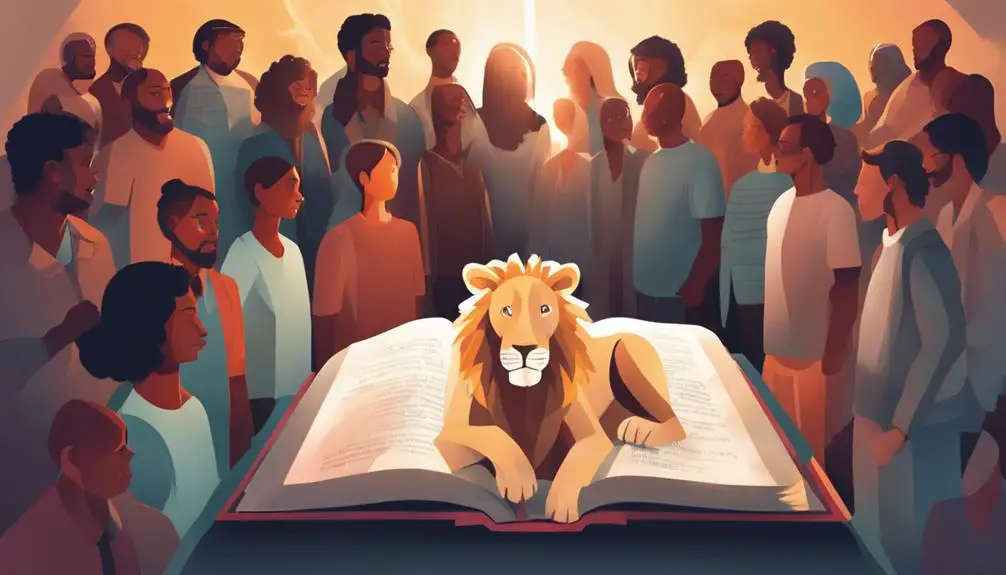Navigate the depths of 'Jehovah Gibbor' in the Bible, a title revealing God's might and protection, and uncover its profound implications.

Jehovah Gibbor in the Bible
In the sacred texts, Jehovah Gibbor emerges as a protector and a warrior, a figure of strength yet a beacon of hope. You'll find that this title, translating to 'The Mighty God' in English, holds layers of meaning and historical significance, meriting a closer look.
Beyond its scriptural references, understanding the implications of Jehovah Gibbor sheds light on its symbolic resonance throughout biblical narratives and its enduring impact on modern interpretations. As you explore this intriguing aspect, you'll uncover how it has shaped theological perspectives and why it continues to captivate scholars and believers alike.
Key Takeaways
- 'Jehovah Gibbor' combines the Hebrew words for God's name and 'mighty,' highlighting divine strength and protection.
- It appears in various Hebrew Bible passages, reflecting God's omnipotence and role as a protector.
- The term's symbolism extends beyond strength, incorporating imagery like a fortress and shepherd, symbolizing guidance and justice.
- Over time, interpretations of 'Jehovah Gibbor' have evolved, influencing modern theological discussions and artistic expressions.
Origins of Jehovah Gibbor

To understand the origins of 'Jehovah Gibbor,' one must delve into the linguistic and historical contexts of the Hebrew Bible. The term 'Jehovah Gibbor' merges two significant Hebrew words: 'Jehovah,' a rendering of the tetragrammaton YHWH, representing the unspoken name of God, and 'Gibbor,' which translates to 'mighty' or 'hero.' This combination elucidates a particular aspect of the divine character, emphasizing strength and valor.
The linguistic roots of 'Jehovah Gibbor' are deeply embedded in the Hebrew language, reflecting a profound reverence and acknowledgment of God's omnipotence. 'Jehovah' itself has undergone various name variations over centuries, adapting to linguistic shifts and theological interpretations. Similarly, 'Gibbor' has been used in multiple contexts within the Hebrew texts, further enriching its connotation when paired with the divine name.
Analyzing these linguistic nuances offers invaluable insights into the way ancient Hebrews perceived and venerated their deity. Each name variation not only denotes a linguistic evolution but also signifies shifts in religious understanding and expression. Thus, 'Jehovah Gibbor' stands as a testament to the dynamic relationship between language, theology, and worship in the Hebrew biblical tradition.
Scriptural References
Several passages in the Hebrew Bible explicitly mention 'Jehovah Gibbor,' highlighting its significance in understanding divine attributes. You'll find that scholars have grappled with translation challenges, striving to convey the nuanced meanings embedded within the original Hebrew text. The term 'Gibbor' itself, often translated as 'mighty' or 'hero,' carries layers of meaning that simple English words can struggle to capture fully.
Pronunciation variations further complicate the scenario. The original Hebrew pronunciation of 'Jehovah Gibbor' has been lost over millennia, leading to debates among scholars and theologians about the most accurate way to vocalize this name of God. These variations not only impact how the term is understood in contemporary discourse but also affect its interpretation in academic and religious studies.
Moreover, the context in which 'Jehovah Gibbor' appears within scripture is critical. Its occurrences aren't merely ornamental but serve to underscore God's omnipotence and his role as a divine warrior or protector. Analyzing these scriptural references demands a careful consideration of both the immediate textual environment and the broader theological implications, ensuring that interpretations remain faithful to the original intent and richness of the biblical language.
Symbolism and Meaning

Exploring the symbolism and meaning behind 'Jehovah Gibbor' reveals deeper layers of interpretation that enhance our understanding of divine attributes. This title, often translated as 'The Lord is Mighty,' carries with it a rich tapestry of symbolism that has left a significant mark on cultural and religious narratives.
To fully grasp the concept, consider the following imagery:
- A fortress standing unassailable against a storm, symbolizing protection and strength.
- A shepherd guiding his flock through perilous valleys, representing guidance and care.
- A judge wielding a balance, embodying justice and righteousness.
- A warrior in battle, illustrating power and victory over evil.
- The sun rising after the darkest night, signifying hope and renewal.
Each of these images serves to deepen our appreciation of the multifaceted nature of Jehovah Gibbor. They highlight not only the might and power inherent in this divine name but also the nurturing, protective, and righteous aspects that are equally important. Understanding these symbols and their meanings allows us to appreciate the broader cultural impact of these divine attributes, influencing how communities interpret divine intervention and support in their lives.
Historical Context
Understanding the historical context of 'Jehovah Gibbor' requires delving into the ancient texts and societal norms that shaped its interpretation and significance. You're stepping into a world where cultural influences and military significance played pivotal roles in shaping beliefs and language. The term 'Jehovah Gibbor' is steeped in these contexts, offering insights into the values and priorities of ancient societies.
In analyzing the term, you encounter a landscape where military prowess wasn't just admired but revered. 'Jehovah Gibbor' reflects this admiration, attributing divine strength and might to God, especially in contexts of protection and victory over enemies. This perspective was crucial in a time when survival often depended on military strength, and divine favor was seen as a key component of victory.
Moreover, cultural influences can't be overlooked. The societal norms of the time were deeply intertwined with religion, and the depiction of God as a mighty warrior resonated with people's understanding of power and authority. This portrayal served not only as a source of comfort but also as a rallying cry, reinforcing the community's cohesion and resolve in the face of adversity.
In essence, exploring the historical context of 'Jehovah Gibbor' uncovers a rich tapestry of cultural and military valuations that shaped its enduring legacy in biblical literature.
Modern Interpretations

In modern times, interpretations of 'Jehovah Gibbor' have evolved, reflecting changes in societal values and theological understanding. The term, traditionally seen as a reference to God's omnipotence, now garners a spectrum of interpretations that resonate with contemporary cultural and theological contexts. This shift has significant implications for both the cultural impact of the phrase and the nature of theological debates surrounding it.
- Cultural Impact: The modern re-interpretation of 'Jehovah Gibbor' has permeated various facets of culture, influencing literature, music, and art, where its representation varies from a symbol of divine strength to a beacon of hope for the oppressed.
- Theological Debates: Scholars engage in robust discussions, debating the nuances of 'Jehovah Gibbor' within the framework of modern theology and its implications for understanding God's nature.
- Ecclesiastical Teaching: Churches and religious institutions reassess their teaching materials to incorporate these evolving interpretations, aiming to make religious texts more accessible and relevant.
- Interfaith Dialogue: The term has found a place in interfaith discussions, where its varied interpretations foster a deeper understanding and respect among different religious communities.
- Personal Reflection: For individuals, 'Jehovah Gibbor' becomes a focal point for personal meditation, often reflecting on the divine strength amidst personal struggles.
These developments underscore the dynamic nature of scriptural interpretation and its ability to adapt to changing societal and theological landscapes.
Frequently Asked Questions
How Do Different Christian Denominations Interpret the Concept of Jehovah Gibbor in Their Theology and Worship Practices?
You'll find that different Christian denominations interpret the concept of divine might in varied ways within their theology and worship practices. This variation directly influences how Gibbor symbolism is integrated into denominational rituals.
Some may emphasize it more in sermons and prayers, reflecting a warrior aspect of divinity, while others might focus on its implications for strength in faith. Each tradition's interpretation shapes how they engage with and embody these theological principles.
Are There Any Notable Artworks or Musical Compositions Inspired by the Title Jehovah Gibbor, and What Are Their Historical or Cultural Significances?
You'll find that artistic interpretations and musical motifs inspired by this title carry deep historical and cultural significance.
Artists and composers have drawn from the theme to create works that explore its profound implications.
These pieces not only reflect the creators' interpretation of the concept but also contribute to the broader cultural understanding of the theme.
They serve as a bridge, connecting audiences across time and space with the rich tapestry of human expression and spirituality.
How Has the Understanding or Emphasis on Jehovah Gibbor Changed During Major Historical Events or Movements Within Christianity, Such as the Reformation or the Modern Evangelical Movement?
Imagine a ship changing its course amidst a stormy sea; similarly, the emphasis on 'Jehovah Gibbor' has navigated through cultural shifts during pivotal moments in Christianity.
During the Reformation, military metaphors highlighted God's might against perceived corruption, aligning with calls for purity and doctrinal changes.
In the modern evangelical movement, the focus has subtly shifted, emphasizing spiritual warfare and personal victory.
This evolution reflects the dynamic relationship between historical events and theological interpretation.
Can the Title Jehovah Gibbor Be Found in Religious Texts Outside of the Bible, Such as the Writings of Early Church Fathers or in Non-Christian Religious Literature?
You're diving into whether the title 'Jehovah Gibbor' pops up in texts beyond the Bible, like writings from early church fathers or non-Christian religious literature. This quest spans interfaith dialogue, shedding light on Gibbor's etymology and its cross-cultural resonance.
Analyzing these sources, you're not just tracing a name but exploring how different traditions might intersect or diverge in their spiritual lexicon, offering a rich, scholarly insight into religious and historical narratives.
How Do Contemporary Theological Debates Address the Concept of Jehovah Gibbor in Relation to Issues of Divine Justice, Power, and Human Suffering?
Navigating the stormy seas of divine paradoxes, you'll find theologians grappling with the concept of divine justice, power, and human suffering. They often explore this through the lens of 'Suffering theodicy,' seeking to reconcile how a powerful, just deity can permit suffering.
These contemporary debates are a crucible where ideas of omnipotence and benevolence are tested, offering insights into the enigmatic nature of divine interaction with the world.
Conclusion
In your journey through the texts, you've seen how Jehovah Gibbor, the Mighty God, stands as a towering figure, not just in ancient script but in the hearts of believers.
Like a lighthouse guiding ships through treacherous waters, this epithet illuminates the divine strength and protection offered to humanity.
Analyzing its roots and interpretations, you've uncovered layers of faith and understanding.
In a world craving strength, Jehovah Gibbor serves as an eternal beacon of hope, a testament to the enduring power of divine might in human history.



Sign up